
Under the slogan of the “great rejuvenation of the Chinese nation,” the Xi Jinping leadership is striving to become the next hegemonic power, replacing the current hegemon, the United States.
One of the most effective means of achieving this goal is through influence operations known as “United Front Work” (UFW).
China’s expanding influence through UFW has recently been noted not only in East Asia, but also in Europe, Africa, Latin America, and other regions.
News of the UK’s banning of a Chinese businessman from the country for the connections he built with politicians as well as with a member of the British royal family is still fresh in our memory.
UFW in Okinawa Prefecture
The focus of UFW activities in Japan is Okinawa Prefecture, which borders Taiwan.
In recent years, the Chinese government has increased political, economic, and cultural exchanges with the prefecture.
The following two objectives can be cited as reasons for this.
First, there is a political estrangement between the Japanese and US governments and the Okinawa Prefectural Government.
As is well known, Xi Jinping has increased his efforts to unify Taiwan and expand China’s maritime power.
If a military conflict were to occur in the Taiwan Strait, Chinese forces could attack US military bases in Okinawa and invade the Senkaku Islands (known as the Diaoyu Islands in China) and other outlying islands in Okinawa Prefecture.
Japan and its ally, the United States, are improving their deterrent capabilities to prevent armed conflict across the Taiwan Strait.
In response, China is exploiting the issue of the US military bases in Okinawa and the backlash against the buildup of the Self-Defense Forces in the Nansei Islands (known in Japan as the “Southwest Shift”) to intensify anti-Japanese and anti-US sentiment among Okinawans.
The goal is to deter and hinder Japan and the US from improving their capabilities to deter China.
Second, there is Xi Jinping’s personal interest in exchanges between China and Okinawa.
Since the 20th National Congress of the Chinese Communist Party in October 2022, Xi’s personal rule has been firmly established. He is also predicted to extend his administration for a fourth term beginning in 2027.
Conversely, Xi developed his personal interest in the historical ties between Okinawa and China during his time in Fujian Province from the mid-1980s to the early 2000s.
Consequently, policy issues related to Okinawa appear to have become a tool in the competition among sub-leaders seeking to curry favor with Xi Jinping, who has a personal attachment to the region.
To win the bureaucratic race and curry favor with the supreme leader, leaders from various bureaucratic organizations and departments across China have begun to engage with the Okinawa issue.
In China, people involved in UFW activities often establish political relationships with specific individuals or organizations under the guise of economic or academic exchanges.
UFW activities targeting Okinawa Prefecture follow the same pattern.
In the economic field, the Japanese people primarily targeted are those who play a role as bridges between Japan and China at the regional level, facilitating economic and social exchange through channels such as sister city ties and economic organizations.
In the academic sphere, the Institute of Japanese Studies, Chinese Academy of Social Sciences, and its newly established affiliated institutions have joined the debate on Okinawa and the East China Sea since the 2020s.
In March 2021, the East China Sea Research Center was launched as a new research institute under the Chinese Academy of Social Sciences that oversees issues in the East China Sea, including Okinawa policy.
The center is headed by the director of the Institute of Japanese Studies.
The center has hosted several international conferences on topics such as opposition to US military bases in Okinawa, opposition to the “Southwest Shift” of the Japanese Self-Defense Forces, and emphasis on Okinawa’s right to self-determination.
Many opinion leaders from Okinawa Prefecture have been invited to these conferences.
Necessary countermeasures
Considering the security tensions surrounding the Taiwan emergency and the territorial dispute over the Senkaku Islands, China’s interference in Okinawa Prefecture through UFW will likely intensify further.
In response to this situation, the basic policy for countermeasures that Japan should take is as follows.
First is human protection. Enhanced protection is necessary for Japanese nationals who are likely to be approached by Chinese authorities, as well as for Chinese nationals residing in Japan.
Second is monitoring and regulating illegal funds moving across borders. For Japan, cracking down on online gambling and strengthening legal regulations is particularly urgent.
According to investigations by Taiwanese authorities, a known method of China’s UFW targeting Taiwan involves using online casinos operated by local Taiwanese anti-social groups, as well as illegal online lending services, to trap former Taiwanese military personnel in debt and turn them into Chinese spies.
Japanese outlaw groups committing similar crimes may unwittingly be aiding Chinese espionage recruitment operations.
It is important to note that the risk of financial disputes involving organized crime online is making China’s UFW a more tangible presence for ordinary citizens.
(Takashi Suzuki is Professor at Institute for Oriental Studies, Daito Bunka University, Japan.)
ADVERTISEMENT
ADVERTISEMENT








































